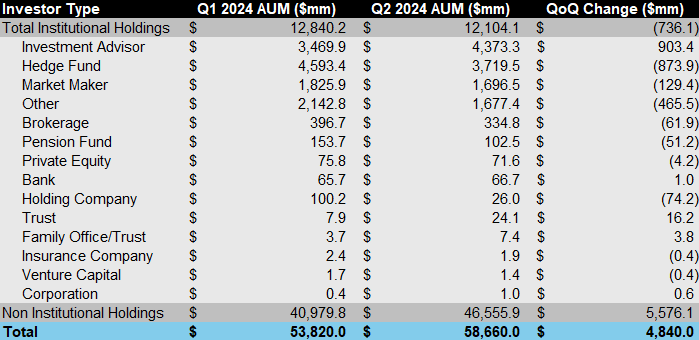.jpg)
Bitcoin's price entered a consolidation phase after its all-time high in March 2024, largely due to factors like the bitcoin halving, the German government's BTC sale, and broader economic concerns. Despite these challenges and a 12% decline in Q2, bitcoin's resilience shines through, closing the quarter near $63,000. This resilience is echoed in the latest Q2 13F filings, which highlight strong institutional demand for bitcoin ETFs, even as prices dipped.
Institutions are not slowing down…

Data Source: Bloomberg

Data Source: Bloomberg
Institutions strategically accumulated more bitcoin ETF shares during Q2, indicating sustained confidence among major institutional investors. The number of institutional holders increased from the mid-900s to over 1,200—a significant leap. For perspective, Vanguard’s Information Technology ETF (VGT), with over $75 billion in AUM and a 20-year history, has just over 1,600 institutional holders. In just over six months, bitcoin spot ETFs have captured more than 70% of the institutional holder base of the world’s second-largest tech ETF.
Advisors and Hedge Funds Continue Their Bitcoin ETF Buying Spree
Advisors' demand for spot bitcoin ETFs grew, increasing their market share of institutional AUM from 27% in Q1 to 36% in Q2, making them the largest group of institutional investors. Hedge funds, now the second-largest holders, still increased their presence, with the number of holders rising from 109 to over 130.
Wall Street Banking Titans Morgan Stanley and Goldman Sachs Dive into the Bitcoin Market:
Banks like Morgan Stanley and Goldman Sachs significantly expanded their bitcoin ETF holdings, with both disclosing holdings exceeding $100 million. This involvement is a milestone, solidifying bitcoin and digital assets as a distinct asset class and paving the way for broader market access.
Additional State Pension Fund Embraces Bitcoin:
The State of Wisconsin Investment Board's Q1 investment in bitcoin ETFs was followed by the State of Michigan Retirement System in Q2, purchasing $6.6 million in bitcoin ETFs. The entry of another state pension fund reflects bitcoin's growing maturity and acceptance as a strategic investment.
Conclusion
Q2 13F filings underscore accelerating institutional demand for bitcoin ETFs. In just seven months, these ETFs would rank as the 30th largest globally, with around $60 billion in AUM. The influx of advisors, hedge funds, and state pension funds highlights a transformative shift in bitcoin's perception—from speculative to strategic. With major banks and pension funds entering the space, bitcoin is moving to the center stage of global finance, driving further adoption and market maturation.


.svg)



_logo.svg)

.svg.png)